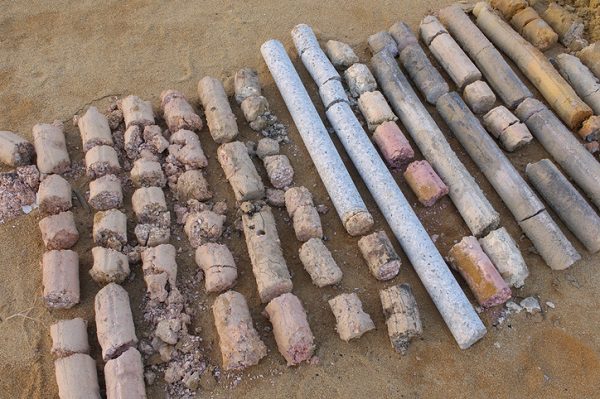Exactly How Geotheta is Reinventing Modern Geotechnical Evaluation and Design
Exactly How Geotheta is Reinventing Modern Geotechnical Evaluation and Design
Blog Article
Unveiling the Important Geotechnical Solutions: Exactly How Geophysical Study, Incline Stability Evaluation, and Groundwater Keeping Track Of Enhance Facilities Development
In the world of infrastructure growth, the relevance of geotechnical solutions can not be overemphasized. Geophysical survey, slope security analysis, and groundwater surveillance stand as pillars that boost the foundation of large-scale projects. These services offer important understandings into the subsurface conditions, possible threats, and total expediency of building ventures. By using the power of advanced modern technologies and professional analysis, framework designers can navigate complex obstacles with foresight and accuracy (geotheta). As we unwind the detailed web of geotechnical solutions, a deeper understanding arises of how these fundamental components balance to not only mitigate risks yet likewise enhance the performance and long life of facilities tasks.
Significance of Geophysical Study
Conducting a geophysical survey is essential in framework development as it provides crucial understandings into the subsurface problems and prospective geological risks. By using different geophysical approaches such as ground-penetrating radar, seismic studies, and electromagnetic induction, engineers and rock hounds can map out the below ground frameworks and determine potential threats prior to construction begins. This positive strategy helps in preventing pricey shocks throughout the building stage, eventually saving money and time.
Geophysical studies are especially beneficial in examining the security of the ground, locating below ground utilities, and determining prospective ecological worries. Comprehending the soil structure, deepness of bedrock, and water table degrees is vital for developing solid foundations and drain systems that can hold up against all-natural forces and avoid soil erosion.
In addition, geophysical surveys play a considerable role in making sure the security and longevity of framework projects by providing necessary information for site choice, path preparation, and danger reduction approaches. Overall, the relevance of geophysical surveys in infrastructure advancement can not be overstated, as they form the foundation for effective and sustainable building and construction jobs.
Enhancing Incline Security Evaluation
Enhancing slope stability evaluation is a crucial facet of geotechnical design in guaranteeing the safety and durability of facilities tasks. By using sophisticated technologies and approaches, geotechnical engineers can assess the security of inclines much more precisely and adequately. One key technique for boosting slope security analysis is the utilization of numerical modeling software application, which allows engineers to simulate various incline conditions and possible failing mechanisms. These designs supply important insights into the factors influencing slope security, such as dirt properties, groundwater levels, and exterior loads.
Moreover, carrying out comprehensive area examinations, including geological surveys and geophysical testing, can boost the accuracy of incline security analysis. On the whole, improving slope security evaluation is important for making certain the long-term safety and security and sustainability of infrastructure projects.
Function of Groundwater Monitoring
Efficient groundwater tracking plays an important role in guaranteeing the security and safety and security of framework jobs. Groundwater levels can substantially impact the architectural stability of foundations, passages, and various other underground frameworks. By continually keeping track of groundwater degrees and high quality, engineers can identify possible risks such as dirt disintegration, structure instability, and waterlogging.
Groundwater tracking helps in evaluating the influence of building activities on neighborhood aquifers and water resources. It allows for the very early discovery of any groundwater contamination, stopping ecological threats and making sure compliance with regulations. By comprehending the groundwater dynamics, engineers can apply suitable dewatering steps to manage water inflow during excavation and building processes, decreasing the danger of flooding and architectural failing.
Integrating Geotechnical Provider
Groundwater monitoring, a critical aspect of infrastructure advancement, prepares for integrating geotechnical services seamlessly right into construction jobs. By comprehending the actions of groundwater within the job website, engineers can make educated decisions concerning structure style, slope security, and overall task feasibility. Integrating geotechnical services includes combining various methods such as geophysical surveys, incline stability evaluation, and groundwater tracking to provide a thorough understanding of the site problems. This integration boosts the overall task construction, style, and preparation stages, leading to a lot more efficient and economical facilities growth.
Moreover, the combination of geotechnical services permits the identification of potential risks and challenges early in the resource project lifecycle, enabling aggressive actions to be applied to minimize these concerns. With a multidisciplinary method that incorporates geophysical, geological, and hydrological information, engineers can optimize construction procedures, lessen ecological impact, and ensure the lasting security and performance of the infrastructure. Overall, integrating geotechnical services is essential for sustainable and effective facilities development.

Benefits for Facilities Growth
In the realm of framework development, the use of incorporated geotechnical solutions brings forth a multitude of advantages that dramatically enhance job end results. Slope stability evaluation plays a crucial function in making certain the safety and durability of facilities by evaluating the security of slopes and suggesting essential reinforcement steps. Generally, the unification more information of geotechnical services in infrastructure advancement not only improves task performance but likewise adds to the long life and strength of created facilities.
Conclusion

Enhancing incline stability evaluation is a critical facet of geotechnical engineering in ensuring the security and strength of facilities tasks. In general, boosting slope stability evaluation is essential for making sure the long-term security and sustainability of framework projects.
Slope security analysis plays a vital role in guaranteeing the safety and security and longevity of facilities by analyzing the stability of slopes and suggesting essential reinforcement steps. geotheta.In final thought, geophysical study, incline stability analysis, and groundwater monitoring are vital geotechnical solutions that play a vital function in improving framework growth. The benefits of incorporating these services into infrastructure advancement are clear, and their value can not be overemphasized in making certain the lasting success and resilience of framework tasks
Report this page